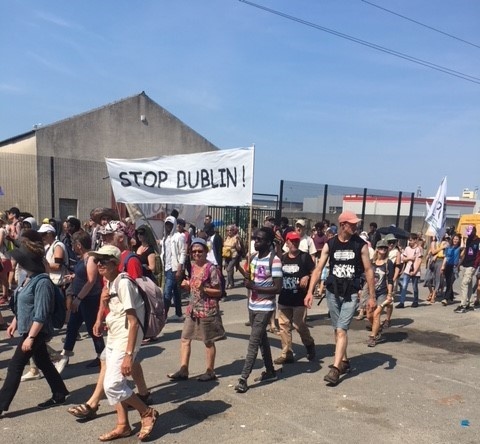
by Maria McCloskey
Maria McCloskey is a solicitor, Chair of the Immigration Practitioners’ Group NI and Vice Chair of the Centre for Global Education’s Management Board. In July 2018, Maria volunteered with Care4Calais. Here, she talks about her experiences and some of the people she met.
Within my first few days in Calais, I met Jamail. He is 23 and from Eritrea, where he worked as a carpenter. He is now (what can only be described as) surviving on the streets of Calais, in the hope of one day achieving his dream: to live in the UK. Jamail left Eritrea for many very valid reasons, including army-conscription, lack of education and having little or no choice about how he lived his life. He talked openly and honestly about his experiences, including the attempts by him and his friends to cross the English Channel by hiding in or clinging to the bottom of lorries. His story highlights the desperation that asylum-seekers experience as they take that life-changing decision to leave their home country, knowing that they might never see their family and loved ones again.
Few people will have heard of Care4Calais, an organisation working on the ground to alleviate the conditions in which many refugees are living. They do so through their ongoing support to those who are trying to make their way to the UK. Each day, vans are driven to different parts of Calais, and to Dunkirk, Paris and Brussels with distributions of food, clothes and toiletries, which have mostly been received in donations from the UK.
Solidarity march for migrants' passing through Calais on 7th July 2018
As a volunteer, it was great to be able to give out much-needed items, but it was difficult to know how to respond to refugees who needed everything on offer, and had difficulty choosing, or those who needed something else entirely. Many asked for shoes, which are in desperately short supply. In a couple of the locations I visited with Care4Calais, it was clear that strong bonds had formed between the refugees. It was heartening to think that they might, for at least some of this awful experience, not be completely on their own.
In a few of the semi permanent campsites, on the outskirts of Calais, however, the residents were somewhat more hardened to the reality and unfairness of the system. In these places I sensed a definite air of desperation.
One encounter with the French border police during my trip will stay with me. As we sat drinking tea and chatting with refugees, a police van pulled in and officers proceeded to patrol the area, one with a baton in his hand; another with a canister of tear gas ‘at the ready’. I had read reports about the French border police – who are funded by the UK government – during my studies at Queen’s University Belfast, which included accounts of physical violence, use of tear gas, slashing tents, smashing mobile phones, and preventing distributions of food and water (beyond strict hourly time limits, imposed by local councils /district authorities).
Towards the end of my week in Calais, I started to feel slightly overwhelmed by the apparent hopelessness of the situation facing the men, women and children seeking asylum in the UK. I chose to focus instead on the inspirational work of so many people and organisations who continue to fight for the rights of refugees and against the injustices of the system. For example, one former volunteer has set up a phone credit charity: a world-wide organisation that provides free ‘top-ups’ to refugees and displaced people. Other organisations are distributing cooked meals, delivering informal English lessons, and providing first aid. And without exception, every single volunteer I met had one thing in common: a desire to offer support and assistance in whatever way they could.
You can read my blog, from the time I spent in Calais, here





